|
|
|
Sort Order |
|
|
|
Items / Page
|
|
|
|
|
|
|
| Srl | Item |
| 1 |
ID:
171743
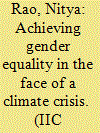

|
|
|
| 2 |
ID:
192005
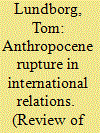

|
|
|
|
|
| Summary/Abstract |
The Anthropocene rupture refers to the beginning of our current geological epoch in which humans constitute a collective geological force that alters the trajectory of the Earth system. An increased engagement with this notion of a rupture has prompted a lively debate on the inherent anthropocentrism of International Relations (IR), and whether it is possible to transform it into something new that embraces diverse forms of existence, human as well as non-human. This article challenges that possibility. It shows how much of the current debate rests on the idea fulfilling future desirable ideals, which are pushed perpetually beyond a horizon of human thought, making them unreachable. As an alternative, the article turns to Jacques Derrida's understanding of the future to come (l'avenir), highlighting the significance of unpredictability and unexpected events. This understanding of the future shows how life within and of the international rests on encounters with the future as something radically other. On this basis, it is argued that responding to our current predicament should proceed not by seeking to fulfil future ideals but by encountering the future as incalculable and other, whose arrival represents an opportunity as much as a threat to established forms of international life.
|
|
|
|
|
|
|
|
|
|
|
|
|
|
|
|
| 3 |
ID:
179622
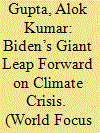

|
|
|
|
|
| Summary/Abstract |
Earth Day on April 22 of 2021 became of great significance as American President Joe Biden kicked off a virtual Summit which was attended by 40 other world leaders. Biden had invited 40 world leaders to the “Leaders’ Summit on Climate”, to underscore the urgency and the economic benefits of stronger climate action. It was attended by almost all the major powers whose participations are extremely necessary to make the policy interventions a successful endeavour.
|
|
|
|
|
|
|
|
|
|
|
|
|
|
|
|
| 4 |
ID:
173819
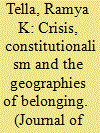

|
|
|
|
|
| Summary/Abstract |
The Anthropocene – as a geological and cultural epoch – brings with it new modes of articulating environmental crisis and citizenship for peoples in India. This essay illustrates how space, scale and identity can be located within contemporary climate political imaginations through the normative canvas of the Indian Constitution. It argues that by thinking about climate change as a collection of dualisms – past/present, near/faraway, futures/futurelessness – Indian vocabularies of constitutionalism can inform authoritative understandings of crisis and citizenship. The article makes use of empirical material collected between 2016–17 for the author's doctoral research. It argues that Indian climate change elites characterize crisis in distinctive ways that draw attention to the symbolic and material implications of interrogating the shifting geographies of belonging in India. It shows how they make use of a framework of constitutionalism that is simultaneously attentive to the semantics of both planetary and subaltern thinking in the Anthropocene.
|
|
|
|
|
|
|
|
|
|
|
|
|
|
|
|
| 5 |
ID:
170227
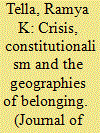

|
|
|
|
|
| Summary/Abstract |
The Anthropocene – as a geological and cultural epoch – brings with it new modes of articulating environmental crisis and citizenship for peoples in India. This essay illustrates how space, scale and identity can be located within contemporary climate political imaginations through the normative canvas of the Indian Constitution. It argues that by thinking about climate change as a collection of dualisms – past/present, near/faraway, futures/futurelessness – Indian vocabularies of constitutionalism can inform authoritative understandings of crisis and citizenship. The article makes use of empirical material collected between 2016–17 for the author's doctoral research. It argues that Indian climate change elites characterize crisis in distinctive ways that draw attention to the symbolic and material implications of interrogating the shifting geographies of belonging in India. It shows how they make use of a framework of constitutionalism that is simultaneously attentive to the semantics of both planetary and subaltern thinking in the Anthropocene.
|
|
|
|
|
|
|
|
|
|
|
|
|
|
|
|
| 6 |
ID:
123759


|
|
|
|
|
| Publication |
2013.
|
| Summary/Abstract |
Can the BRICS (Brazil, Russia, India, China, and South Africa) build on their momentum to transform the international order, or will they be remembered as a geopolitical fad? To assess the prospects of the figurehead for emerging power aspirations, this article examines the associational dynamics and practices that inform their collective journey. Drawing on the rationalist literature on bargaining coalitions and on the constructivist literature on 'imagined' communities, we develop an analytical framework to investigate whether states exploit their BRICS affiliation tactically, to rise in tandem, or strategically, to rise together. Two case studies, which examine BRICS efforts to curb Washington's 'exorbitant privilege' and to develop a collective response to the climate crisis suggest that even when the BRICS share soft revisionist goals, coalitional cohesion and community formation are tentative at best. In the absence of clear common objectives, the BRICS abandon all but the rhetoric of coalitional behaviour. We conclude that unless the five emerging powers agree on a coherent strategy to harness their relative strengths, the BRICS' geopolitical play will be defeated by their own tactical ploys.
|
|
|
|
|
|
|
|
|
|
|
|
|
|
|
|
| 7 |
ID:
174342
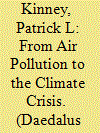

|
|
|
| 8 |
ID:
171744
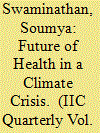

|
|
|
| 9 |
ID:
104696
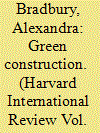

|
|
|
| 10 |
ID:
188745


|
|
|
|
|
| Summary/Abstract |
This essay offers an introduction to a special section on ecology and performance in South Asia. Aiming at ‘green’ studies of music and performance, this collection explores intersections between ethnography, history, eco- and ethnomusicology, and film and performance studies by paying particular attention to the ecological turn more broadly visible in South Asian studies. The papers address varied ecological settings of South Asian music and performance, from riverscapes to coastal communities, and from the locations of instrument-makers to negotiations of the climate crisis and the COVID-19 pandemic. The novelty of the section lies not just in mapping the dialogism between ecology and music through reflections on liminality, gender, resistance and identity, but also in bringing forth new archival strategies (digitisation and digital cultures) in conversation with ethnographic findings.
|
|
|
|
|
|
|
|
|
|
|
|
|
|
|
|
| 11 |
ID:
188746
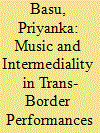

|
|
|
|
|
| Summary/Abstract |
Climate crisis has emerged as an important theme in the performances of patachitra or scroll painting in West Bengal. Besides depicting contemporary subjects, the scrolls also tell traditional stories, such as that of the Manasamangal, through songs and visuals. Across the border, in Bangladesh, the Manasamangal narrative finds numerous embodiments in living traditions, thus closely highlighting a human–nature connection. This paper considers several such performance genres and studies them through the intermediality of printed literature, visual depictions, sound recordings and performance practices in curated spaces. In doing so, it challenges the land-centric frameworks of disciplines and instead understands them through a liquescent methodological approach.
|
|
|
|
|
|
|
|
|
|
|
|
|
|
|
|
| 12 |
ID:
182264
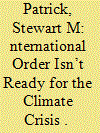

|
|
|
|
|
| Summary/Abstract |
The planet is in the throes of an environmental emergency.
Humanity’s continued addiction to fossil fuels and its voracious appetite for natural resources have led to runaway climate change, degraded vital ecosystems, and ushered in the slow death
ofthe world’s oceans. Earth’s biosphere is breaking down. Our depredation ofthe planet has jeopardized our own survival.
|
|
|
|
|
|
|
|
|
|
|
|
|
|
|
|
| 13 |
ID:
092237
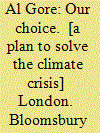

|
|
|
|
|
| Publication |
London, Bloomsbury Publishing, 2009.
|
| Description |
415p.
|
| Standard Number |
9780747590989
|
|
|
|
|
|
|
|
|
|
|
|
Copies: C:1/I:0,R:0,Q:0
Circulation
| Accession# | Call# | Current Location | Status | Policy | Location |
| 054594 | 363.7/AL 054594 | Main | On Shelf | General | |
|
|
|
|
| 14 |
ID:
183449
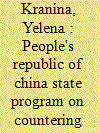

|
|
|
|
|
| Summary/Abstract |
In the 21st century, after the COVID-19 pandemic, climate change, expressed in the increase in the average annual temperature and the frequency and intensity of extreme climatic phenomena (droughts, floods, tornadoes, sudden thaws, frosts, melting glaciers, etc.), has become the most difficult and potentially most dangerous environmental problem. All these phenomena cause significant damage to nature, human beings, and the economy. Climate change is associated with the increase of the "greenhouse effect" - the total increase in the concentration of greenhouse gases in the atmosphere due to human economic activity; industrial, transport, and agricultural emissions; deforestation; and land degradation.
Even though the causes of the emergence of the COVID-19 pandemic and climate change remain unclear, and the proposed hypotheses have not been proved by anyone, the world community accuses China of environmental dishonesty. Indeed, due to current historical circumstances, China is the biggest producer of greenhouse gases. It amounts to about 30% of all the global emissions, i.e., twice as much as the US. It pollutes the air more than all European countries combined, and over the past 20 years, CO2 emissions have grown six times faster than elsewhere in the world. The country's share of global greenhouse gas emissions is significantly higher than its share of the global GDP (about 19.35%), i.e., it has a "large carbon footprint," and special efforts are required to reduce it.
|
|
|
|
|
|
|
|
|
|
|
|
|
|
|
|
| 15 |
ID:
179470
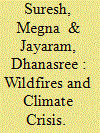

|
|
|
|
|
|
|
|